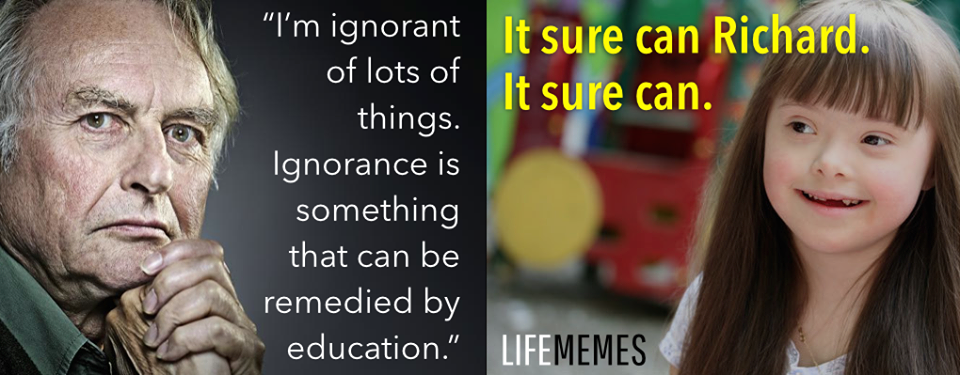I speak as someone who is a fan of Dawkins’ books, has an academic science education, is considered to be expert in the field in which I work, but who has knowledge on this particular subject that would dwarf the Professor’s.
I’m sure the Dawkins could teach me more than a thing or two about cells, chromosomes, evolution and the finer points of molecular genetics. Very interested I would be too. But expertise in one field does not translate automatically to another. Even where there is an apparent link – in this case genetics – which has misled Dawkins to consider himself informed.
I would like to respond in kind by teaching him the lessons that I have learned in a mere 18 months by having a baby daughter with Down’s Syndrome.
I understand the Professor’s point of view implicitly. In fact, what he says still makes total logical sense to me. His conclusion is the natural one to arrive at when you approach the dilemma logically given the available information, an objective mind-set and (crucially) a non-religious point of view.
18 months ago I would even have agreed. The arrival of my daughter with the surprise of having this very condition has shone a light on the gulf of ignorance, not to mention the factually incorrect prejudice underlying this opinion. Reading the Professor’s opinion back does horrify me now to think what I might have done, had the condition been diagnosed during pregnancy.
I know how much more fulfilled our lives are now that our eyes are open. Most of all, I'm astounded at how absolutely normal everything continues to be - both for us and for other families I have met.
I put my hands up to say that, without knowing it, our baby has already taught us the most groundbreaking lessons of our lives so far, and we would quite literally change nothing about her - especially her genetic profile. It has completely turned on their head my opinions on what success in life looks like and what my aspirations should be for all of our children. I always end up in the same place, happiness and contentment are what ultimately matter, and I know that Rosie will have those in abundance.
Thanks to her, I believe we’ll be in a better position to encourage such success for her sister and brother-to-be, unshackled by the notion that success in life is solely linked to academic attainment, careers and money. Many of these things can lead to total misery for a person, even though that person’s pushy parents will be high-fiving in the background revelling in a job well done.
So, Richard, I can only assert that you will have to take my word for it. I know your opinion - inside and out. I can even imagine some of the things that you'll say in response before you say them.
But much as I appreciate you only had 140 characters to work with, the flippancy with which you would snuff out the life, love, joy and opportunity of that little human being is astonishing.
“Why not?” You might say. “The child has a known genetic inferiority.”
Yes, this is true. And that leads to a lower than average IQ. Some are prone to surmountable heart problems. So what?
I struggle to see how the same logic should not be applied to other things that the Professor’s branch of science can now tell us. Were he to have his way and the fallacy of the “affliction” of genetic conditions like Down’s Syndrome were to be eradicated altogether. Forgotten. A long and distant memory. What genetic profile would we then consider to be inferior? Foetus’s with a genetic predisposition to obesity? Homosexuality? Brown eyes?
“The child would feel no pain at that stage.” He may say.
Also true. So we should snuff out future humans who do not fit the Professor’s notion of perfection purely because we can? If at first you don’t succeed (at achieving the perfect baby) try, try, try again? I wonder who gets the last word on what the perfect profile looks like then?
Ironically Dawkins wants to start acting like the being who is most commonly in receipt of his vitriol – God.
Solely using genetic superiority as the only mode of selection only goes to show the gargantuan breadth of closed-minded misunderstanding that underpins the Professor’s opinion. It ignores the delightful, happy, contented and fruitful life that people with Down’s Syndrome have and ignores the benefits of acceptance that they bring to everyone who surrounds them.
Mr Dawkins too often assumes that dissenting voices are merely so because the individuals concerned lack the capacity to understand his intellectual reasoning. The truth is that sometimes it’s because they know stuff that you don't. Hard to take, I imagine, when you are a Professor.


 RSS Feed
RSS Feed
